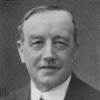Arthur Henderson

Arthur Henderson
Arthur Henderson PCwas a British iron moulder and Labour politician. He was the first Labour cabinet minister, won the Nobel Peace Prize in 1934 and, uniquely, served three separate terms as Leader of the Labour Party in three different decades. He was popular among his colleagues, who called him "Uncle Arthur" in acknowledgement of his integrity, his devotion to the cause and his imperturbability. He was a transitional figure whose policies were, at first, close to those of the Liberal...
NationalityBritish
ProfessionPolitician
Date of Birth13 September 1863
Arthur Henderson quotes about
I do not believe that the values which the Western democracies consider essential to civilization can survive in a world rent by the international anarchy of nationalism and the economic anarchy of competitive enterprise.
The nations must be organized internationally and induced to enter into partnership, subordinating in some measure national sovereignty to worldwide institutions and obligations.
The years of the economic depression have been years of political reaction, and that is why the economic crisis has generated a world peace crisis.
In short, it may be said that on paper the obligations to settle international disputes peacefully are now so comprehensive and far-reaching that it is almost impossible for a state to resort to war without violating one or more solemn treaty obligations.
Four years of world war, at a cost in human suffering which our minds are mercifully too limited to imagine, led to the very clear realization that international anarchy must be abandoned if civilization was to survive.
Originally the League was forbidden to touch the subject of tariffs, and there was a strong predisposition to regard banking as a mystery that must be removed entirely from the purview of governments.
It has been said that since September, 1931, the world has been divided into wholehearted violators and halfhearted supporters of the Covenant.
On the contrary, the characteristic element of the present situation is that economic questions have finally and irrevocably invaded the domain of public life and politics.
Another essential to a universal and durable peace is social justice.
This is our world, and we must make the best of it.
To solve the problem of organizing world peace we must establish world law and order.
The forces that are driving mankind toward unity and peace are deep-seated and powerful. They are material and natural, as well as moral and intellectual.
Perhaps the grimmest aspect of this great paradox is that the very nations that are chiefly responsible for starting and for maintaining the Disarmament Conference are also the nations that have begun a new arms race.
Whatever we do or fail to do will influence the course of history.